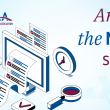EU helps French research institute unlock mysteries of 70% of Earth’s surface

From studying toxic microplankton to currents and ocean temperatures, the Euro Hab and Euro-Argo projects are trying to understand the oceans.
From the top of the Pointe du Diable in Western France, the 610 employees of the French research institute for the use of the sea (Ifremer) in Plouzané examine the Atlantic Ocean.
“There’s no end to studying the ocean because the ocean covers 70% of the planet at a depth of four or five kilometres”. The oceanographer Guillaume Maze, the head of the Argo project, manages the French section of a programme that covers 30 countries and has already deployed 3,900 floats.
These devices continuously analyse the water temperature and its salinity around the planet. “To observe an ocean, you have to be everywhere all the time,” Maze explains.
It is the autonomy of the floats – which can remain at sea for years and still send the information it collects by satellite every ten days – that allows the oceans to be studied in all circumstances.
“Historically, the measurements taken by boats are biased because more are carried out during the seasons of good weather and in easily accessible regions. This is not the case with the floats,” the researcher said.
Proven ocean warming
Between the first global oceanographic expedition in 1872 and today, the surface of the ocean warmed by 0.6°C. Between 2006 and 2017, the underwater temperature increased by 0.3°C.
With these new measurements, “we have been able to highlight the warming of the oceans,” Maze explained. This is key monitoring work as 93% of the heat created by humans is stored in all the world’s oceans. “Today, the question is knowing whether the ocean will continue to store the excess heat or not,” the researcher asked.
In order to monitor developments in the ocean, the Argo floats now need to access the most remote areas. These include the poles, where gaining access is complicated by the ice, and abysses, depths of over 2,000 metres.
These developments will need funding, potentially without the United Kingdom’s involvement. Twelve European countries contribute together to Argo within Euro-Argo. “This coordination also allows us to answer more European questions. And to benefit for European funds, for example, to fund more floats,” explained Maze.
now needed to address the issue, writes Dr. Erik van Sebille.
Brexit, a risk for research programmes
However, Brexit could change the situation. “We have just won a €4 million project for four years from Europe, which will start in 2019. The United Kingdom is very interested in the ocean and will certainly continue to fund Argo, but we still don’t know how,” Maze said.
“For now, it’s the status quo. When Brexit really happens, there will surely be changes,” acknowledged Grigor Obolensky, who runs the Euro-Argo programme.
The question of the future of cooperation with the United Kingdom also relates to research projects around the English Channel. These include the Euro Hab project, which uses satellites from the European Space Agency to study micro-algae and toxic species of microplankton present on both sides of the Channel.
“This project originated two years ago from a joint idea with a colleague from Plymouth,” explained Francis Gohens, Euro Hab’s leader for Ifremer. The project also benefits from European subsidies as part of Interreg, the European fund dedicated to border regions.
“We’re trying to understand the situations in which toxic algae and microplankton will develop. Because this has an impact on the water quality, aquaculture, shellfish farming and also tourism.”
Satellite surveillance should provide a quick warning for the appearance and spread of harmful algae. It should also allow fishermen and shellfish farmers to best deal with this.
Written by euractiv.fr


